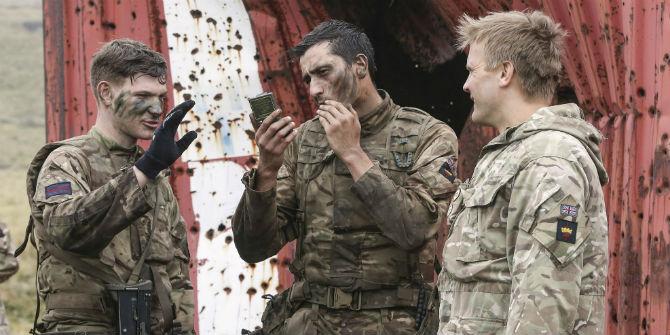 Britain’s willingness to join a new European defence force shows that Brexit need not mean an end to security co-operation with our neighbours. In fact, argues Tara McCormack (University of Leicester), it represents an opportunity to rethink ill-advised military actions and tactical support for wars led by geopolitical allies. Instead, some senior politicians remain obsessed by the desire to maintain Britain’s status as a ‘tier one’ military power – a position that, going by defence spending, we have already relinquished.
Britain’s willingness to join a new European defence force shows that Brexit need not mean an end to security co-operation with our neighbours. In fact, argues Tara McCormack (University of Leicester), it represents an opportunity to rethink ill-advised military actions and tactical support for wars led by geopolitical allies. Instead, some senior politicians remain obsessed by the desire to maintain Britain’s status as a ‘tier one’ military power – a position that, going by defence spending, we have already relinquished.
Next year Britain will be leaving the EU. What will the effect of this institutional change be on Britain’s foreign and security policies? On the one hand, foreign and security policies with the EU have mostly been governed at state level or within other supra-national institutions – which for Britain means NATO, and the ‘Five Eyes’ intelligence system.
Although mooted for many years, EU-level military forces have always been held back by inter-state disagreements. On the other hand, there is little doubt that Britain and other EU nations are keen to stress that European security and defence co-operation will remain solid.

It is not just Brexit, however, that accounts for this, but serious intra-EU strains – over migration, the Eurozone and social policies, to name a few – and also fears over America’s commitment to NATO and Europe. It is in this context that we can understand the French-driven European Intervention Initiative. This proposed crisis force of eight European states, including Britain, will operate outside of EU and NATO structures. Meanwhile, the House of Commons Defence Committee has just released a report on modernising Britain’s defence that argues that it needs to spend an extra £20bn a year or risk losing influence with America. Without it, Lord General Houghton has warned, the country will lose its global standing as a leading defence nation. Again, the political context of Brexit and broader geopolitical shifts loom large.
The Prime Minister’s response, which was to question the need to maintain Britain’s status as a ‘tier one military power’, seems to have kicked a hornet’s nest in her own cabinet. The defence secretary Gavin Williamson has reportedly threatened to ‘bring May down’ in response (he subsequently denied threatening the PM). His shadow Nia Griffiths is claiming that Labour would spend more on defence. Yet the ‘who will spend more’ debate is an empty one. It avoids a fundamental discussion that must come first. What is it all for? What do we want to spend our money on and to what purpose? What do we want to do and what are our interests anyway? The words ‘national interest’ are used regularly, but there is little discussion of what that might be or of how individual policies might contribute to it.
In that sense, May is entirely right to say that defence policy needs justification. Brexit can and should be an opportunity for Britain to have a serious debate about our foreign and security policies and our underlying national interests. Unfortunately, at the moment, British politicians and the military establishment are like cyclists who daren’t stop pedalling to actually think about their actions – beyond a fixation with maintaining Britain’s status as a big military power.
What does that mean anyway? America and China spend hundreds of billions more on arms than any other states. According to the Stockholm International Peace Research Institute, America spends $610bn annually, China spends $228bn and Saudi Arabia is the third highest spender with $69.4bn. Russia comes in fourth, spending $66.3bn in 2017 (20% lower than the previous year, and set to fall further). Britain, India, Japan and France are next hovering in the mid $50bn range. Beyond our nuclear arsenal, Britain and France are not ‘tier one military powers’ – if by that we mean the highest spenders.
But aside from doubling down on nostalgia for when Britain ruled the waves, we need to step back and think much more seriously about what we want to do and be in the world. The debate about British foreign and security policy, and the underlying question about our national interests, has been preserved in aspic since the end of the second world war. Existential questions that emerged with the end of empire were rapidly subsumed by the Cold War. British foreign and security policy has historically always been led by a greater context. With the end of the Cold War, this was gone. Since then there have been several foreign policy ‘concepts’ mooted by both parties: ethical foreign policy; the ‘end of foreign policy’; foreign policy in a networked world. And today, it seems, our defence secretary is very keen to go back to the clarity of the Cold War and imagine that today’s Russia is a reincarnation of the Soviet Union.
We need an honest discussion and also an honest evaluation of post-Cold War British foreign policy. For example, a phrase much used by our government and opposition at the moment is that of the ‘rules based international order’: our foreign and security policy, and our underlying national interests, are said to be in the service of supporting this. I think the government is absolutely right, and that it is in our national interests broadly to support a stable and predictable world in which states act within an agreed framework of rules. However, in terms of the post-Cold War period, British foreign policy as a ‘tier one military power’ has been extremely destabilising.
The Chilcot Report makes for damning reading. A British Prime Minister constructed a false narrative in order to engage the country in a devastating military intervention. Unfortunately, today the Iraq war is treated as a ‘Kremlin talking point’ or a minor British political spat rather than a warning about the future. This was a war that destroyed a country, killed millions and set off a chain of disastrous events that we are still dealing with today. Then, despite disavowing Blair’s interventionism, David Cameron plunged into an intervention in Libya, based on faulty intelligence and lacking strategic direction. It became a disastrous regime change operation that has left a power vacuum which ISIS is filling, and a human rights disaster. A country that was the richest in Africa is now a lawless disaster zone and home to ISIS slave markets.
In Syria we have fully supported America, Saudi Arabia and Turkey in their funding and military support of Takfiri militant groups against the Syrian government. Our special forces train militant sectarian groups such as Jaish Awsoud Al-Sharqiah. We also fully support, militarily and diplomatically, Saudi Arabia and the Gulf states’ war against Yemen, which the UN describes as the world’s biggest humanitarian disaster. Even as we castigate Russia for their UN security veto when it comes to their Syrian ally, Britain recently blocked a UN Security Council resolution calling on Saudi Arabia and its Gulf allies to implement a ceasefire. Last but not least, the Prime Minister launched airstrikes against Syria in the face of overwhelming public opposition and with the potential to end up in a military confrontation with Russia.
Do we want any of this? Britain needs to have a serious democratic debate about foreign policy and the role that we want our country to play in the world. This means an honest debate that moves beyond bombast, platitudes and sheer hypocrisy. Brexit has the potential to open up a space for debate. One approach would be to genuinely support a ‘rules based international order’. That would mean, however, disavowing much of our current foreign policy; rejecting regime change; not automatically supporting the wars of our allies; supporting diplomacy and negotiation rather than military action; and most importantly, asserting democratic control over foreign and security policy decisions.
This post represents the views of the author and not those of the Brexit blog, nor the LSE.
Dr Tara McCormack is a lecturer in politics and international relations at the University of Leicester.







If there was any capacity for logical thinking in the government they would encourage an EU Defence Force, friendly relations with Russia and China, and a cessation of reliance on the US. Fat chance though – they are too busy investing in shares in BAE and demonising Russia to encourage the share value.